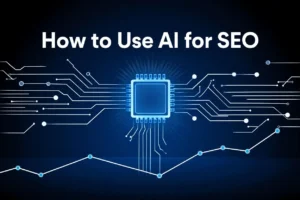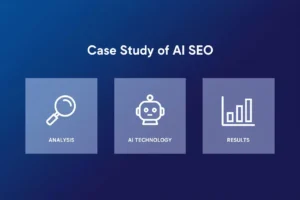1. AI-Driven Content Clustering That Predicts Search Intent
Most of the websites struggle with quality content. They are still posting random blog posts like “Top 10 Tips for home maintenance” without any structure, hierarchy, or semantic depth. Here’s the smarter way: content clustering powered by AI.- Tools like Surfer SEO, MarketMuse, and Frase don’t just help with keyword stuffing. They build topic clusters that predict user intent and map out your entire content strategy.
- Instead of writing 20 isolated blog posts, you build a pillar page with supporting content interlinked intelligently.
- AI scrapes competitors, identifies content gaps, and tells you exactly what to publish next to dominate an entire search vertical.
- This isn’t just for the sake of content. It’s an AI-powered architecture that boosts topical authority, one of the biggest ranking factors in 2025.
2. Predictive Keyword Modelling Using AI Algorithms
Keyword research used to be about volume and CPC. Now it’s about predictive ranking potential. A modern AI SEO agency isn’t just looking at what people are searching today; they are forecasting what people will be searching next quarter. Platforms like BrightEdge and Clearscope are using machine learning to:- Identify emerging keywords before they peak
- Score keywords based on competitive landscape + topical authority
- Evaluate potential keyword ranking successes at periodic intervals.
3. Dynamic On-Page SEO Optimization (Real-Time Adjustments)
Here’s what most SEOs miss: On-page optimization shouldn’t be static. You optimize a page once, publish it, and forget it. But search trends shift. Competitors update. Google rewrites its algorithm again. And your content gets buried. Now imagine this:- Your H1S, internal links, and FAQs adjust automatically based on SERP volatility
- Your AI monitors top-ranking pages in real time and updates your content accordingly.
- Schema markup, page speed tweaks, and even image alt texts are updated without human intervention.
4. AI-Powered Competitor Gap Analysis
Let AI spy on your competitors. You don’t need to scroll through their blog posts or count backlinks manually anymore. Modern AI SEO services will:- Crawl your competitors’ entire site structure
- Map their internal linking architecture.
- Pinpoint content gaps
- Analyze backlink quality and velocity.
- Detect declining keywords; they’re losing ground on
5. AI for Voice Search and Multimodal SEO
Most websites still optimize for screens. But Google isn’t just serving desktops anymore. With AI assistants, smart speakers, and voice-based search on mobile, the game is shifting fast. And here’s where AI SEO works:- It can analyze voice queries vs typed queries (different length, tone, structure)
- It can optimize featured snippets and answer boxes with natural-sounding copy.
- It adapts for multimodal experiences, think visual search, voice search, and screenless browsing.
 How to Use AI for SEO
AI SEO is about letting it co-pilot while you drive. Enhancing your knowledge on the means to integrate AI for SEO accelerates automation where human intuition is still dominating. The idea is to let AI do the human-intensive tasks while you can focus on creating engaging content in a human tone.
The trick is in how you use them. Just adding keywords into ChatGPT or assembling AI-generated blogs isn’t going to outrank anyone. What will put you ahead is using AI in your SEO strategy, precisely, strategically, and with a clear goal in mind.
Here’s how you can use AI for SEO the smart way:
How to Use AI for SEO
AI SEO is about letting it co-pilot while you drive. Enhancing your knowledge on the means to integrate AI for SEO accelerates automation where human intuition is still dominating. The idea is to let AI do the human-intensive tasks while you can focus on creating engaging content in a human tone.
The trick is in how you use them. Just adding keywords into ChatGPT or assembling AI-generated blogs isn’t going to outrank anyone. What will put you ahead is using AI in your SEO strategy, precisely, strategically, and with a clear goal in mind.
Here’s how you can use AI for SEO the smart way:
1. Use AI to Find Keywords That Matter
Forget bloated keyword lists with zero context. AI cuts through the chase and gets straight to what your audience is searching for. Here’s how AI helps with smarter keyword research:- Clarity on search intent: AI analyses search intent and helps you target relevant keywords that answer the queries on search engines.
- Long-tail goldmines: Nobody searches for just “boots” anymore. People want answers that fit their exact need, like “best hiking boots for wide feet.” Tools like Surfer and Frase help you find those exact-match phrases and use them where they matter.
- Clustered topics: Instead of writing 10 blogs that cannibalize each other, AI helps group related terms so you build authority without duplication.
- Voice-of-customer language: You’ll spot real-world phrasing pulled from forums, Reddit, and review sites.
2. Let AI Help You Build Smarter Content Outlines
Nobody loves outlining, but AI turns it into a cheat code. Here’s how AI transforms your pre-writing process:- Topic analysis: Tools like MarketMuse scan top pages and show what themes dominate the SERP.
- Headline suggestions: You’ll get H1-H4 structure ideas based on what Google already favours.
- FAQs surfaced: Pulls real questions from People Also Ask, Reddit, and Quora, perfect for feature snippets.
- Suggested media: Some platforms even recommend images, videos, and tables to include based on SERP behaviour.
3. Write and Optimize at the Same Time
Waiting until the end to “SEO your content” is a mistake. AI helps you optimize while you write. Here’s how real-time AI content scoring changes the game:- Live keyword suggestions: Add important terms as you write, without sounding robotic.
- Content gap alerts: AI flags what top pages include that you’re missing, so you can fill those blind spots.
- Readability coaching: Fix dense paragraphs, confusing phrases, and passive voice while you’re in the zone.
- SEO grade tracker: See a live content score (like A+ or 90/100) and adjust in real-time without breaking flow.
4. Use AI to Keep Old Content Alive and Kicking
Google rewards freshness. AI helps you revive stale blog posts and put them back in the rankings race. Here’s how AI helps with content updates:- Decay detection: Tools like Dashword or Outranking alert you when traffic drops on a post.
- Quick win suggestions: Add a missing keyword, update a stat, or rework an intro, and rankings bounce back.
- Content scoring: AI compares your post against newer SERP winners and gives you actionable fixes.
- Internal link refresh: Update anchor texts and interlink to new pages automatically.
5. Spy on Competitors Without Losing Your Soul
You don’t need to mimic your rivals, but you do need to understand what’s working for them. AI helps you reverse-engineer their success. Here’s what you can uncover with AI-powered competitor research:- Keyword overlap: Spot which terms they’re dominating, and which you can steal.
- Content structure: See how their blogs are organized, from headline flow to CTA placement.
- Backlink insights: Know who’s linking to them and pitch those same domains with something better.
- Topical blind spots: Discover areas they don’t cover well, and own them.
6. Automate the Tedious SEO Chores
SEO tasks can be tedious. AI automation helps you ease through the process. Here’s what AI can handle while you sleep:- Broken link scans: Don’t wait for Google, worse, a customer to find a broken page. Most people only find broken links after Google has. Stay a step ahead by running regular scans with Screaming Frog or Sitebulb; you’ll catch the issues before they cost you trust or traffic.
- Smart internal linking: Manually finding internal link opportunities is a time suck. Link Whisper takes that off your plate by analyzing your content and suggesting relevant links automatically, based on meaning, not just keywords.
- Schema markup: Use SchemaApp to generate structured data for recipes, articles, and reviews, no developer needed.
- Meta tag optimization: AI writes and tests meta descriptions that improve CTR.
The Challenges of AI-Based SEO
Not all AI SEO services are created equal. Some businesses jump on the trend, integrate “AI” into their process, and still generate retrogressive backend material. To avoid falling into that trap, make sure your AI SEO strategy checks these boxes:- Custom-trained AI models (not just generic prompts)
- Real-time data integrations (not last year’s stats)
- Human-AI hybrid workflows (AI assists, humans refine)
- Built-in A/B testing so you measure outcomes, not just outputs
Case Study: How AI SEO Transcends Manual SEO in 90 Days
A SaaS company using traditional SEO was stuck on page 3 for their core keyword, despite months of effort. They switched to an AI SEO agency that implemented the five tactics you just read:- Built intent-driven topic clusters
- Deployed predictive keyword modelling
- Ran live content optimization scripts
- Executed weekly competitor gap scans
- Optimized for voice snippets and assistant queries Result?
- +248% increase in organic traffic in 3 months
- From page 3 to page 1 (position #2)
- 6x increase in qualified leads from organic search
What About Google’s AI Policies?
A lot of marketers are nervous about using AI for content. Won’t Google penalize it? Here’s the current stance (as of mid-2025): Google doesn’t care how content is produced. It cares if it’s useful. So yes, if you’re using AI to produce zero-value blog posts, expect a hostile response. But if you are using AI to enhance quality, structure, depth, and user intent, you are not violating any guidelines. You’re just being efficient. AI should enhance human thinking, not replace it.Turn Traffic Into Revenue, Let’s Build Your SEO Engine
Your competitors are not unknown. They’re just slow. And by the time they catch on to AI SEO optimization, you will already be 100 blogs ahead, ranking #1 for the terms they are still researching. At CS Web Solutions, we don’t just use AI, we build strategies around it. Our team blends automation with human insight, using AI SEO optimization tools not just to boost rankings, but to make your content magnetic to both search engines and people. You can either wait around, hoping your current SEO agency magically figures it out, or you can get aggressive. Start experimenting. Start deploying these tactics yourself or contact us. Because in 2025, ranking on Google isn’t about luck. It’s about leverage. And AI is the biggest leverage you’ve got.Let’s Outrank the Competition Together
If you are serious about growing traffic, visibility, and leads without spending a fortune on outdated tactics, start using AI. Want to see where AI can boost your SEO the fastest? We will show you what’s holding your rankings back. Contact us now and schedule your free audit today!Frequently Asked Questions
What is AI SEO, and why is it beating “traditional” SEO?
AI SEO represents a new approach that outperforms conventional search engine optimization methods because it predicts user intent through machine learning. AI SEO uses machine learning to predict user search intent while clustering topics and finding keyword opportunities.
Will Google penalize content created with AI?
The content creation process through AI does not face Google penalties. Google focuses on providing useful content rather than identifying the source of creation. Your website will suffer if you publish generic AI content that lacks substance. The search engine considers human-edited content that AI tools assist to develop and maintain as acceptable material.
How do I start with AI SEO in the next 30 days?
During the initial week you should focus on building intent clusters through Surfer/Frase tools. During the second week you should perform predictive keyword analysis using Clearscope/BrightEdge tools. The third week requires you to implement dynamic on-page updates through content scoring tools. During the fourth week you should perform competitor gap analysis to optimize your content for voice snippets.
What kind of results can AI SEO deliver, and how fast?
Sites that implement clustering with predictive keywords and live optimization and gap analysis typically observe search rank improvements within 4–12 weeks starting with increased impressions followed by clicks and leads. Within 90 days a SaaS experienced a page 3 to page 2 jump and six times more leads.
Biggest mistakes to avoid with AI SEO?
Relying on generic prompts, simply uploading AI text unedited, and just focusing on volume and not intent, plus overlooking freshness and measurement. Use custom models or rigid prompts, human review, real-time data, scheduled refresh, and A/B testing.



